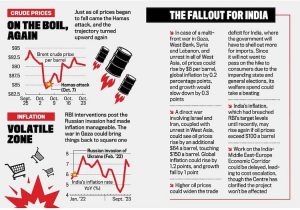The impact of the Russia-Ukraine war on a global economy that was just recovering from the ravages of the COVID-19 pandemic was quite widespread. Involving a major energy producer i.e. Russia and a major agricultural producer – Ukraine, the war has led to high energy prices, a global food shortage, and inflation.
Both the developed world and the emerging economies are growing far slower than expected. The International Monetary Fund (IMF) estimates that global growth will slow down from 3.5% in 2022 to 3% in 2023 and to 2.9% in 2024, well below the historical average of 3.8%. Despite the disruption in energy and food markets and the unprecedented monetary tightening to combat decades-high inflation, economic activity has slowed down but not stalled.
However, a month ago the economic situation worsened with the Israel-Hamas war that has broken out. Hundreds of Israelis and Palestinians have died or been injured in the conflict, so far. The death toll is expected to rise dramatically as Israel has been targeting the densely populated Gaza Strip. Despite some calls for peace, a cease-fire appears impossible currently.
Analysts are of the view that if the war escalates to a point where other countries in the region, especially Iran are drawn in, it could lead to major disruptions and worldwide slowdown.

Global Impact
It is evident that geopolitics has become a significant factor affecting the outlook for the global economy and financial markets for the past four to five years – the disruptions of Brexit, the China-US cold war, the Russian invasion of Ukraine, and now the Israel-Hamas war.
Crude Oil – The oil-producing Islamic countries in the Israel-Gaza neighbourhood (i.e. in West Asia) namely Saudi Arabia, Iran, and others play a very significant role in the production and supply of crude oil globally, contributing around 1/3rd of the global output. Any disruption to the oil output/supply will surely raise prices across the board having a negative impact on net energy importers such as India, China, and others.
A recent report by Bloomberg Economics considers the likely impact of the conflict on crude oil prices, global growth, and inflation under three scenarios –
1) Firstly, if the war is confined largely to Israel and the Palestinian territories of Gaza and the West Bank, the impact will be limited, not making any significant change in oil prices, inflation, or growth. (Brent crude prices were trading around $80 on November 10th, 2023.)
2) Secondly, in case of a multi-front war in Gaza, West Bank, Syria, and Lebanon, and unrest in wider West Asia, oil prices could rise by $8 – $10 per barrel, inflation by 0.2%, and growth would slow by 0.3%.
3) Thirdly, a direct war involving Israel and Iran, coupled with unrest in West Asia, could see oil prices rising by an additional $65 -$70 a barrel, reaching the $150 a barrel range. Inflation, meanwhile, could rise by 1.2% and GDP growth fall by 1%.
The IMF estimates that a sustained 10% increase in oil prices shaves 0.15 % off global economic growth and adds 0.4% to inflation.
Global Supply Chain – Akin to the impact of the Ukraine conflict on the Global Supply Chain for food and other commodities, this time again the crucial sectors that are getting affected apart from energy include semi-conductor technology, pharma, high tech, logistics, etc.
Israel is one of the few important hubs for international chip makers and semiconductor start-ups outside of East Asia. Advanced chip design and production are being done by global majors like Intel, Nvidia, Apple, Microsoft, etc. Additionally, the Country’s important $2 bn Pharma and Healthcare supply chain industry could be disrupted. It accounts for 1.1% and 0.8% of US and EU pharma imports respectively. It remains to be seen with Israel neck deep in the conflict to what extent the output and exports of these sectors get affected.
Transport and Logistics – The conflict has impacted the stability of the International North South Transport Corridor (INSTC). This is a vital trade route that connects Russia, Iran and India amongst other countries, exposing the vulnerability of global supply chains to geo-political events that occur thousands of miles away.
Further, the proximity to the conflict zone of the Global maritime trade route through the Suez Canal (controlled by Egypt) which is used for the transportation of goods between Europe and Asia as well as the Straits of Hormuz (mainly controlled by Iran) which is important for Oil & Gas shipping, has the potential to severely impact World Trade by delays in deliveries and increase in freight rates.
Impact on Inflation and Interest Rates – The start of this conflict has come at a time of enormous economic uncertainty even as the war in Ukraine continues to plod on. The world over Central Banks have raised interest rates to record levels in an effort to reign in high inflation since last year. Many countries like the US, UK, the EU, and others are caught between the devil and the deep sea. On one side unable to reduce already peaked interest rates with inflation threatening to rise again and on the other, any further increase in rates could take them towards severe slowdowns and recessions.
Possible Impact on India
Currently, the Indian Economy is holding reasonably steady on the Macro Economic front.
- Strong Domestic demand in Q3 is expected to sustain economic growth in FY 2024 at 6.7%.
- After a period of high inflation, signs of it coming down are brightening with it touching a 4-month low of 4.8% in October.
- Forex reserves which have been fluctuating over the past year are again inching back close to March 2022 levels of around $ 600 bn ($590 bn).
- Industrial growth however has been see- sawing slowing down to a 3-month low of 5.8% in September after touching 10.3% in August– the highest in 14 months.
Impact of rising crude oil prices: The Indian economy and the global economy are linked in multiple ways. In the short term, the rising oil prices will have an impact and the government may try and insulate against it, in view of the impending elections which could have a negative impact on government spending. Post the Russian invasion of Ukraine, India had handled the situation of high oil prices smoothly by seeking out cheaper Russian crude. In the current instance, neither Israel nor Gaza is a significant oil producer, but as discussed earlier the war could have repercussions across West Asia, which is home to major oil producers like Iran and Saudi Arabia.

Net Net…
Depending on how the war pans out from here, the Global as well as India’s economic resilience could be severely tested. The worst-case scenario could trigger a 1970s-type oil shock, followed by global stagflation (rising inflation and lower growth) much like or worse than the impact of the Ukraine conflict.
Currently, India is growing in good stead with expectations of 6 /6.5% of GDP growth. A good compounded growth turning into earnings growth can mean a good and steady rise in the stock markets but as mentioned above we cannot be immune to geo-political challenges. We also have upcoming elections whose outcome can also impact markets.
A strong domestic flow of about 15000 crs per month in SIPs as well as active direct stock investors has made India less dependent on foreign investments. As long as our investors are optimistic about our own markets, we should remain stable.
We believe that keeping in mind the challenges ahead of unfolding escalations in the war overseas investors should be cautious and watch their portfolio closely.
If tensions escalate then maybe reduce allocations to equity and take cover in bonds or safer avenues. But if you want to continue exposure to equity then safer avenues like Sensex/Nifty index funds are a good option.
All in all, just for humanity’s sake we just hope better sense prevails and the war ends quickly.


No Comment